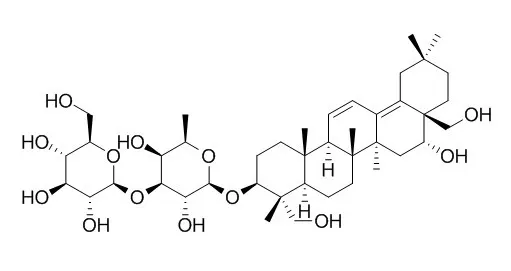A vaccine against hepatitis C virus (HCV) is unavailable and cost-effective antivirals that prevent HCV infection and re-infection, such as in the transplant setting, do not exist. In a search for novel and economical prophylactic agents, we examined the antiviral activity of saikosaponins (SSa, SSb2, SSc, and SSd) from Bupleurum kaoi root (BK) as entry inhibitors against HCV infection.
METHODS AND RESULTS:
Infectious HCV culture systems were used to examine the effect of saikosaponins on the complete virus life cycle (entry, RNA replication/translation, and particle production). Antiviral activity against various HCV genotypes, clinical isolates, and infection of primary human hepatocytes were also evaluated.
BK and the saikosaponins potently inhibited HCV infection at non-cytotoxic concentrations. These natural agents targeted early steps of the viral life cycle, while leaving replication/translation, egress, and spread relatively unaffected. In particular, we identified Saikosaponin B2(SSb2) as an efficient inhibitor of early HCV entry, including neutralization of virus particles, preventing viral attachment, and inhibiting viral entry/fusion. Binding analysis, using soluble viral glycoproteins, demonstrated that SSb2 acted on HCV E2. Moreover, SSb2 inhibited infection by several genotypic strains and prevented binding of serum-derived HCV onto hepatoma cells. Finally, treatment with the compound blocked HCV infection of primary human hepatocytes.
CONCLUSIONS:
Due to its potency, SSb2 may be of value for development as an antagonist of HCV entry and could be explored as prophylactic treatment during the course of liver transplantation. |






 Cell. 2018 Jan 11;172(1-2):249-261.e12. doi: 10.1016/j.cell.2017.12.019.IF=36.216(2019)
Cell. 2018 Jan 11;172(1-2):249-261.e12. doi: 10.1016/j.cell.2017.12.019.IF=36.216(2019) Cell Metab. 2020 Mar 3;31(3):534-548.e5. doi: 10.1016/j.cmet.2020.01.002.IF=22.415(2019)
Cell Metab. 2020 Mar 3;31(3):534-548.e5. doi: 10.1016/j.cmet.2020.01.002.IF=22.415(2019) Mol Cell. 2017 Nov 16;68(4):673-685.e6. doi: 10.1016/j.molcel.2017.10.022.IF=14.548(2019)
Mol Cell. 2017 Nov 16;68(4):673-685.e6. doi: 10.1016/j.molcel.2017.10.022.IF=14.548(2019)